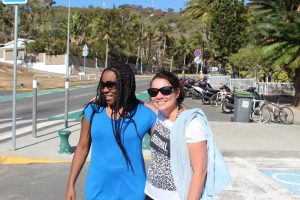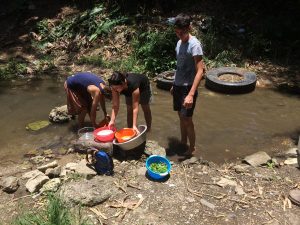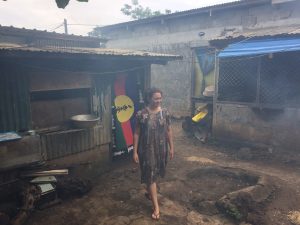Module 5
La grammaire : L’imparfait
L’imparfait can be translated into four different forms en anglais :
To do = I was doing, I used to do/I would do/I did ;
To dance= I was dancing, I used to dance/I would dance/I danced;
To leave = I was leaving, I used to leave/would leave/I left;
To get up = I was getting up, I used to get up/would get up/I got up;
To think = I was thinking, I used to think/would think/*thought;
These four ways of expressing oneself in English can all be translate into French via the use of the “imparfait”.
Also keep in mind that it can be translated as:
I used to have/would have/*had;
I used to be /would be/*was
(a) I was doing, I was dancing, I was leaving, I was getting up: When using this form, we imagine ourselves (or we imagine someone) reliving an action or a situation that happened in the past and that has continued for a while.
(b) I used to do/I would do/I did, I used to dance/I would dance/I danced, I used to leave/would leave/I left, I used to get up/would get up/I got up. In this context, we are talking about an action that was repeated in the past. “Would” has several meanings in English; the meaning we are interested in here is when “would” = “used to”.
Likewise, “did”, “danced”, “left”, “got up” have several meanings (I left once, I left repeatedly). It is the ‘left’ that is a repetition that interests us here.
Notez que pour *thought, *was, *had, on parle quelquefois d’un état (a state of mind, of being, of having) qui a continué pendant un certain temps au passé.
How to form l’imparfait :
A part from the verb être, all the verbs are formed in the same way. For example, let’s look at some regular verbs from the three types of verb groups (er/ir/re).
If you want to conjugate the verb « regarder » in the imparfait :
(Step 1) Prenez la première personne du pluriel, nous, du présent de l’indicatif, nous regardons.
(Step 2) Supprimez -ons- regard-
(Step 3) Ajoutez les terminaisons : -ais, -ais, ait, ions, iez, aient.
Exemple:
L’imparfait du verbe regarder:
Je regardais
tu regardais
elle/il/on regardait
nous regardions
vous regardiez
ils/elles regardaient
D’autres examples:
(Step 1) L’infinitif: danser/ finir/attendre
(Step 2) Conjugez avec nous au présent : dansons / finissons / attendons
A vous: Conjugez ces trois verbes a l’imparfait comme le verbe regarder ci-dessus.
A vous : Identifiez les verbes dans les phrases ci-dessous et mettez ces verbes à l’imparfait:
- Nous réussissons toujours à gagner la course de va’a.
- Il va partir de la baie de Prony.
- Ils viennent de passer sur la place des cocotiers.
- Je crois que c’est possible de faire un umu.
- On aime beaucoup habiter à Mata Utu .
Explication supplémentaire:
Les verbes en –oir/oire ne se constituent pas en groupe à l’imparfait mais se conforment à la règle générale pour leur formation : voir, nous voyons, je voyais ; boire, nous buvons, je buvais ; vouloir, nous voulons, je voulais ; avoir, nous avons, j’avais …
Le seul verbe dont la racine à l’imparfait est irrégulière, c’est être : j’étais.
Notez toutefois :
- étudier = j’étudiais, tu étudiais, il étudiait, nous étudiions, vous étudiiez, ils étudiaient ;
- les verbes avec un ‘g’ comme dernière lettre de la racine – manger, nager, neiger (il) …- qui ajoutent un ‘e’ devant le ‘a’ : manger je mangeais, tu mangeais, elle mangeait, nous mangions, vous mangiez, elles mangeaient ;
- de la même façon, ‘c’ met une cédille – commencer, tancer, lancer, pincer … : commencer je commençais, tu commençais, on commençait, nous commencions, vous commenciez, ils commençaient ;
- il y a beaucoup de verbes en –ir qui ne se conjuguent pas comme finir – sortir, partir, mentir, venir, sentir : je sortais, je partais, je mentais, je venais, je sentais…
- les verbes en e + consonne + er ou en é + consonne + er qui, au présent, varient l’orthographe du premier e (e/è ou é/è) ne varient pas à l’imparfait : je me levais, tu te levais, il se levait, nous nous levions, vous vous leviez, ils se levaient ; j’espérais, tu espérais, elle espérait, nous espérions, vous espériez, ils espé
Le négatif : Je ne regardais pas, je ne me levais pas ;
L’interrogatif : Est-ce que tu regardais …. ? Regardais-tu … ? Tu regardais … ?
COMPARAISON
Les sens du passé composé et de l’imparfait, résumons :
(a) The past tense (passé composé):
We are talking about an action that took place once in the past. Imagine taking a photo with your camera.
(b) The imperfect (imparfait):
We imagine someone reliving an action or situation that happened in the past and that has continued for a while. Imagine recording a movie with your camera.
Moreover, when we use the imperfect, we are talking about a state of being in the past or a state of mind in the past. Examples of verbs that describe a state of mind: to think, to believe, to want, to hope, to know, to fear / to be afraid, to be happy …
We can also note another use of the imperfect which will change the relation to reality during one’s speech.
(a) by reducing the strength of a demand:
For example :
– Je venais vous demander si vous vouliez m’accorder un petit rendez-vous.
(b) by reducing the impact of an unpleasant truth:
For example :
– Le 17 juin 2017 Baldwin Lonsdale s’éteignait à Port Vila.
(c) by emphasizing the dramatic side of an event by putting the reader back to the heart of the action:
For example:
– Le 6 mars 2015 le Vanuatu entraient en alerte numéro 5 à cause du cyclone Pam.
A vous : Complétez avec le passé composé ou l’imparfait en utilisant les verbes entre parenthèses et en faisant tout autre changement que vous jugez nécessaire. Discuter de votre choix avec vos camarades de classe :
Il ____________ (partir) parce qu’il ____________ (ne pas avoir envie) de voir perdre son équipe, Les Cagous OFC. Au moment où il ____________ (quitter) le stade son équipe ____________ (avoir) deux buts de moins que ses adversaires et il ne ____________ (rester)
que cinq minutes à jouer. Toutefois, quand il ____________ (attendre) son bus à l’extérieur du stade, il ____________ (entendre) crier plusieurs fois les spectateurs mais il ____________ (ne pas savoir) ce qu’ils ____________ (applaudir). Le soir sur télé NC un reportage ____________ (annoncer) la victoire étonnante des Cagous sur les Bula Boys de quatre buts à deux.
Activité de Recherche
Choisissez trois mots/termes soulignés ci-dessus en vert puis rédigez un résumé en français ou en anglais pour les expliquer. Vous pouvez également par la suite partager vos découvertes à voix haute avec le reste de votre classe.
Activité d’écoute: Les Sports Traditionels de Polynésie
Activité de construction de phrases: Le Sport
Améliorez vos compétences en écriture en construisant et en développant les phrases ci-dessous:
- Le football est…
- Les joueurs étaient …
- En principe, le match de …
- Les équipes …
- Le stade n’avait pas…
- Je joue …
Find the Words
Analyse et discussion: Analysez les images et décrivez-les en français. Vous êtes encouragés à utiliser des verbes au passé-composé et à l’imparfait dans vos descriptions.





360 Pacific French Adventure: Au Magasin
Voices of the Pacific French: Desaccords Communs NC
Watch this video clip and discuss with a partner what you understand and see:
Learn more about Le Destin Commun du Caillou (aka New-Caledonia).

